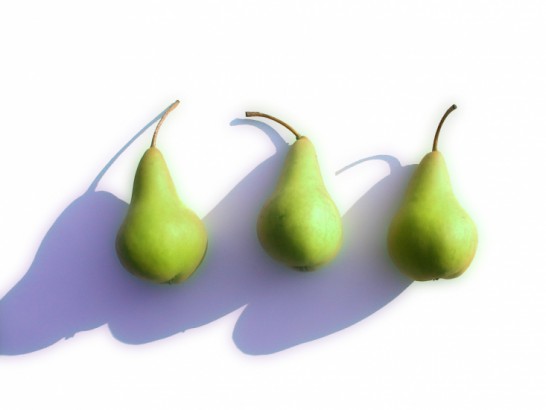What are the health benefits of pear?
mis à jour le 7 October 2015 à 00:03
Pear: Delicious, nutritious and great for your body! Take a look at some of the benefits of one of our favourite fruits.
Seasonal fruits:
Whether crisp or smooth, pear has been known almost since the dawn of time. Countless varieties (over three thousand) are friends of the temperate climates. They come from two sources, Asian and European. Pears are labelled as a climacteric fruit as they continue to ripen after picking, and even faster when placed near a banana, for instance. For this reason it can be bought whilst still a little unripe.
Anti-dehydrating:
Rich in water (84%) and semi-calorie-filled (about 50calories/100g, like apples), pears are refreshing. It contains vitamins (including E and B9), potassium, and many trace elements (copper, zinc, cobalt, etc.) This makes it a good source of mineral replenishment. It is also well endowed with fibre (2.3 g/100 g) to facilitate digestion. In traditional Chinese medicine, pear is classified as a “water” food, suitable for fighting the “dryness” of the body and moistening the lungs and throat, especially if you drink the juice. We should consume the antioxidant-rich skin, especially if the fruit is organically produced.
Ally to haute-cuisine:
Pear brings a tasty bite when paired with soft cheeses: Roquefort, Gorgonzola... It goes even better when nuts are thrown into the picture. It may not seem so, but pear is also one of the best friends of cocoa.
Good recipes:
For a healthy gourmet dessert, cook pears with ginger, pepper and cinnamon, which all have very strong anti-oxidising effects, in tea or red wine with honey. For a chutney to enjoy with poultry or white meat, boil 500g of firm pears, peeled and cored, and chopped lemon, with 1 chopped onion, 100 g of apple cider vinegar, 100 g of water, 100g brown sugar, 1 stick of cinnamon, black pepper, 10 slices of fresh ginger, green cardamom pods 10, 30g of Muscat wine and a couple of sticks of dried chilli, if desired. Place in a sterilised jar once the juice has become syrupy.
Tummy pains:
Pears may be difficult to digest because it contains a portion of insoluble fibre, as well as sorbitol, a sugar that some have low tolerance for. Opt for the softer varieties, consume only when at full maturity, and peel the fruit before eating. You can also cook or squeeze lemon juice over the flesh of the fruit, to soften the fibres.



